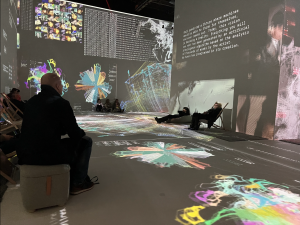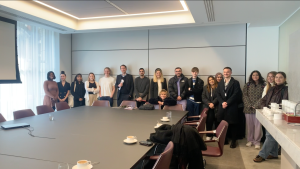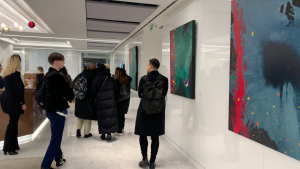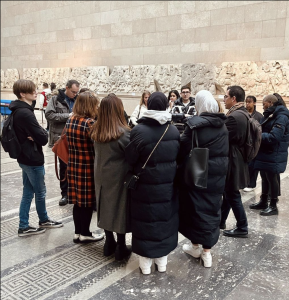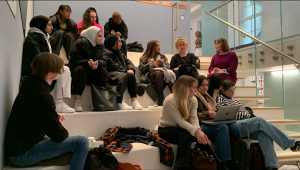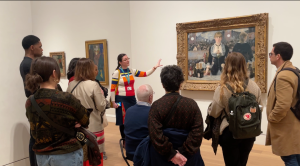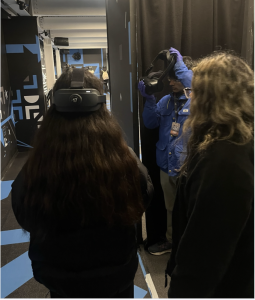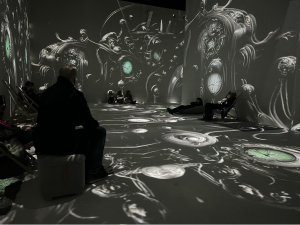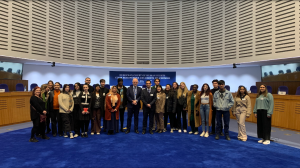
In another impressive first for the Law Department, 22 students from across Year 1 to 3 of the LLB Law programme (and pathways) attended a Grand Chamber hearing at the European Court of Human Rights and met with the UK Judge at the Court, Judge Tim Eicke KC.
The trip provided students with unique insights of the work of the European Court of Human Rights including careers at the Court and Council of Europe, and led to thought provoking conversations on the right to strike, Judge Sofra O’Leary, the first female President in the history of the Court but also the politicisation of the work of the Court, particularly in the UK, where the government has introduced legislation to reform the Human Rights Act and alter the relationship with the European Court of Human Rights.
Inkeri, a Year 3 LLB student, who started her course in September 2020, when Universities were battling with the effects of Covid, remarked:
It was incredible that Goldsmiths and the Law Department were able to give this opportunity to so many students. We missed a whole year of teaching in person, which took away many chances to get to know our peers and to fully engage with learning. The trip was not only a great learning opportunity and experience but an amazing chance in getting to know other year threes better, as well as year 2 and year 1 students. Of course, being able to go see a case at the European Court of Human Rights was the highlight of the trip. I really enjoyed observing how each party argued their case and how the judges analysed and asked relevant questions. It was intellectually stimulating and helped in many ways to put into practice what I have learnt during the past three years.
Led by the Head of the Law Department, Prof Dimitrios Giannoulopoulos, and the department’s Legal Practice and Law Clinics Administrator, Christine Copping, the group made an early start, boarding one of the first Eurostars of the day to make the long, but fun, journey to Strasbourg, via Paris. Before long, students from different year groups were making new acquaintances; they were teasing each other over card games and music preferences and other non-University matters before we reached Paris, – a key ambition of our winter/spring trip abroad and Athens summer school is to bring students closer together, and this trip was getting very successful at that, very early on.
It was incredible that Goldsmiths and the law department were able to give this opportunity to so many students. We missed a whole year of teaching in person, which took away many chances to get to know our peers and to fully engage with learning. The trip was not only a great learning opportunity and experience but an amazing chance in getting to know other year threes better, as well as year 2 and year 1 students – Inkeri, Year 3 LLB student
The second leg of the long journey saw us board a high speed train (TGV) in Paris, and, at speeds reaching approximately 350 km/hour, we arrived in Strasbourg with only half an hour before we were to meet with the UK Judge at the Court, Judge Tim Eicke. Before we realised it, we were crossing the doors of the European Court of Human Rights, just as preparations in the main courtroom were being finalised for the Grand Chamber hearing the following morning. Judge Eicke welcomed us to the Court with a big smile, then quickly took us into the main courtroom! We looked in awe, thinking “that’s where it all happens”, this is the Court that decides human rights matters affecting more than 800 million people in Europe!
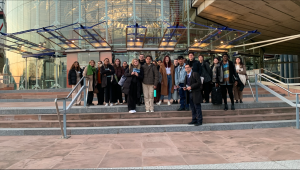
Outside the European Court of Human Rights
Before we could take it all in, Judge Eicke took us to the Court’s press room, for a workshop. He addressed the operation of the Court, and key concepts such as the “margin of appreciation” and “European consensus”, before reflecting on questions from our students, such as on the career pathway that took him to Strasbourg or on how the British Bill of Rights might affect the operation of the ECHR in the UK.
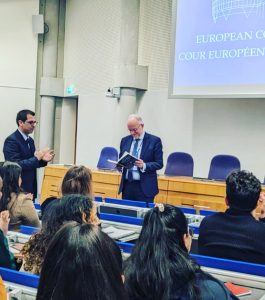 The one hour workshop finished with Professor Giannoulopoulos giving to Judge Eicke a copy of his recent book (with Prof Yvonne McDermott), on Judicial Independence Under Threat, as a token of our appreciation for Judge Eicke’s extremely kind reception at the Court, on the eve of a Grand Chamber hearing he would be sitting in not least. We are hugely grateful to him and his team for the way in which they welcomed us to the Court.
The one hour workshop finished with Professor Giannoulopoulos giving to Judge Eicke a copy of his recent book (with Prof Yvonne McDermott), on Judicial Independence Under Threat, as a token of our appreciation for Judge Eicke’s extremely kind reception at the Court, on the eve of a Grand Chamber hearing he would be sitting in not least. We are hugely grateful to him and his team for the way in which they welcomed us to the Court.
Day 1 came to an end with a wonderful 3-course dinner, at a traditional Alsatian restaurant. Students were then able to explore picturesque “Strasbourg by night”. The cathedral is perhaps one of the most impressive in Europe.
Another very early start was scheduled for the following day: breakfast at 7 a.m., and the group would be on its way to the Court before 07.45. The students’ organisation was put to the test, and they were all impeccable. By 08.30 a.m. we were entering the Court again, this time amongst dozens of other visitors, including the legal teams leading in the case and court officials.
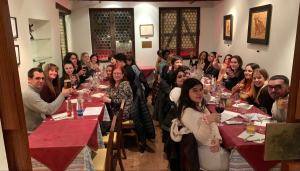
More than just an academic programme…
The case was Humpert and Others v. Germany. The applicants Karin Humpert, Kerstin Wienrank, Eberhard Grabs and Monika Dahl, are German nationals, teachers who are employed by different Bundesländer as civil servants. In 2009 and 2010, respectively, they did not turn up to work for between one hour and three days, demanding an improvement in learning and working conditions. They were subsequently subjected to disciplinary sanctions for having been on strike. The applicants challenged the decisions against them in different administrative courts and the Federal Constitutional Court, to no avail. The Federal Constitutional Court held in particular that the Basic Law banned civil servants from going on strike, which it considered compatible with the European Convention of Human Rights and the European Court’s case-law. The applicants complained under Article 11 (freedom of assembly and association) and under Article 14 (prohibition of discrimination) in conjunction with Article 11 of the European Convention on Human Rights that the ban on teachers – with civil-servant status – striking was not prescribed by law, was disproportionate and, in comparison with teachers employed on a contractual basis, discriminatory.
‘Without the right to strike, collective bargaining would be reduced to collective begging. The two remain inseparable’, commented Loretta, another Year 3 student, after the hearing.
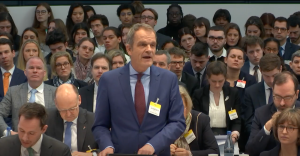
The legal team for the respondent country, Germany, in the case of Humpert and others v Germany (with Armand, Lily, Hamidha, Megan, Alex, Menelaos, Loretta, other Goldsmiths Law students and Prof Giannoulopoulos in the audience in the background)
It was a very academically intense day and a half for all since departing from London, so the rest of the stay in Strasbourg was officially deemed “free time”. The students were delighted. They split in small groups, to explore the old town, in the sunshine – we were very lucky with the weather.


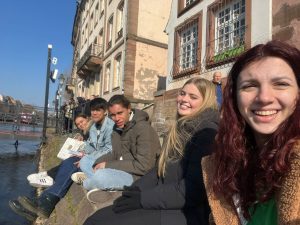
During the long trip back you could easily tell some great friendships were already being formed… Back to London a few hours later, at St Pancras station, Prof Giannoulopoulos asked everyone to gather one last time: it had been such a privilege that we were able to visit the leading human rights court in Europe, he told the students, and they had all, once again, made everyone at Goldsmiths very proud, with their professionalism and politeness and empathy with each other, and with their academic effort… A shower of messages on the WhatsApp group we were using for communication followed: “I had so much fun. This is definitely a trip I will always remember”, texted Jess. “It was an honour to be part of this”, added Anja. “Thanks for inspiring us as always”, Scarlett said, joining the conversation (and she has only been with us for a few months, as a Year 1 student). “It’s one for the books for me”, pointed our Armand, simply and powerfully. “It was an amazing experience”, echoed Angelene. “It is very rare to be able to go on a trip which is equally as insightful as it is fun… we’re more grateful for it than you know”, commented Lily, and it sounded like the perfect concluding line…
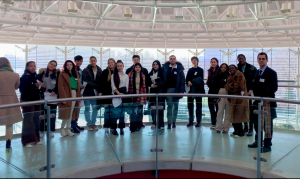
After the Grand Chamber hearing, as we are leaving the courtroom at the European Court of human Rights.
The trip was supported by major scholarships paid by the Department of Law, and the School of Culture & Society, which took away 75% of the cost of the journey for all 22 students.
The Department of Law, and School of Culture & Society, are committed to widening access to these unique opportunities. The Law Department aims to host a winter/spring visit to international courts on an annual basis. Coupled with its annual summer school in Athens, these are initiatives that offer students unique access into legal cosmopolitanism, while building outstanding community and memories that we hope will last our graduates a lifetime.
We would like to express our sincere thanks to Ms Isabella Pilavachi-Jolly, from the Visitors’ Unit/Unité des visites at the Registry of the European Court of Human Rights, and Mr Andrew Cutting, spokesperson at the Council of Europe, for their invaluable support with this trip. The trip would have not been possible without their support.
